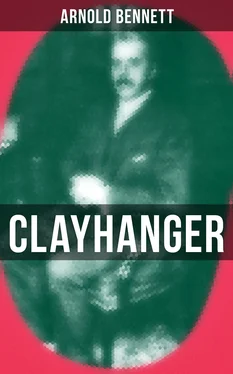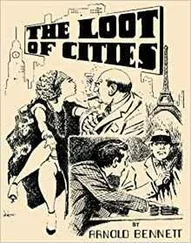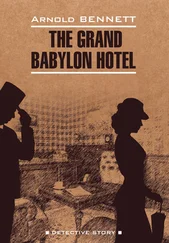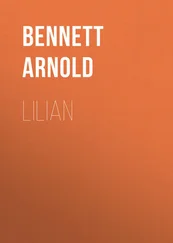Edwin was dashed. His faith in humanity was dashed. These elders were not sincere. And as Mrs Hamps continued to embroider the original theme of her exhortation about the Bible, Edwin looked at her stealthily, and the doubt crossed his mind whether that majestic and vital woman was ever sincere about anything, even to herself—whether the whole of her daily existence, from her getting-up to her down-lying, was not a grandiose pretence.
Not that he had the least desire to cling to the Bible class, even as an alternative to the shop! No! He was much relieved to be rid of the Bible class. What overset him was the crude illogicality of the new decree, and the shameless tacit admission of previous insincerity.
Two hours later, as he stood idly at the window of his bedroom, watching the gas lamps of Trafalgar Road wax brighter in the last glooms of twilight, he was still occupied with the sham and the unreason and the lack of scruple suddenly revealed in the life of the elder generation. Unconsciously imitating a trick of his father’s when annoyed but calm, he nodded his head several times, and with his tongue against his teeth made the noise which in writing is represented by ‘tut-tut.’ Yet somehow he had always known that it would be so. At bottom, he was only pretending to himself to be shocked and outraged.
His plans were no further advanced; indeed they were put back, for this Saturday afternoon vigil in the shop would be in some sort a symbolic temporary defeat for him. Why had he not spoken out clearly? Why was he always like a baby in presence of his father? The future was all askew for him. He had forgotten his tremendous serious resolves. The touch of the half-sovereign in his pocket, however, was comforting in a universe of discomfort.
Chapter Eight.
In the Shop.
Table of Contents
“Here, lad!” said his father to Edwin, as soon as he had scraped up the last crumbs of cheese from his plate at the end of dinner on the following day.
Edwin rose obediently and followed him out of the room. Having waited at the top of the stairs until his father had reached the foot, he leaned forward as far as he could with one hand on the rail and the other pressing against the wall, swooped down to the mat at the bottom, without touching a single step on the way, and made a rocket-like noise with his mouth, He had no other manner of descending the staircase, unless he happened to be in disgrace. His father went straight to the desk in the corner behind the account-book window, assumed his spectacles, and lifted the lid of the desk.
“Here!” he said, in a low voice. “Mr Enoch Peake is stepping in this afternoon to look at this here.” He displayed the proof—an unusually elaborate wedding card, which announced the marriage of Mr Enoch Peake with Mrs Louisa Loggerheads. “Ye know him as I mean?”
“Yes,” said Edwin, “The stout man. The Cocknage Gardens man.”
“That’s him. Well ye’ll tell him I’ve been called away. Tell him who ye are. Not but what he’ll know. Tell him I think it might be better”—Darius’s thick finger ran along a line of print—“if we put—‘widow of the late Simon Loggerheads Esquire,’ instead of—‘Esq.’ See? Otherwise it’s all right. Tell him I say as otherwise it’s all right. And ask him if he’ll have it printed in silver, and how many he wants, and show him this sample envelope. Now, d’ye understand?”
“Yes,” said Edwin, in a tone to convey, not disrespectfully, that there was nothing to understand. Curious, how his father had the air of bracing all his intellect as if to a problem!
“Then ye’ll take it to Big James, and he can start Chawner on it. Th’ job’s promised for Monday forenoon.”
“Will Big James be working?” asked Edwin, for it was Saturday afternoon, when, though the shop remained open, the printing office was closed.
“They’re all on overtime,” said Mr Clayhanger; and then he added, in a voice still lower, and with a surreptitious glance at Miss Ingamells, the shop-woman, who was stolidly enfolding newspapers in wrappers at the opposite counter, “See to it yourself, now. He won’t want to talk to her about a thing like that. Tell him I told you specially. Just let me see how well ye can do it.”
“Right!” said Edwin; and to himself, superciliously: “It might be life and death.”
“We ought to be doing a lot o’ business wi’ Enoch Peake, later on,” Mr Clayhanger finished, in a whisper.
“I see,” said Edwin, impressed, perceiving that he had perhaps been supercilious too soon.
Mr Clayhanger returned his spectacles to their case, and taking his hat from its customary hook behind him, over the job-files, consulted his watch and passed round the counter to go. Then he stopped.
“I’m going to Manchester,” he murmured confidentially. “To see if I can pick up a machine as I’ve heard of.”
Edwin was flattered. At the dinner-table Mr Clayhanger had only vouchsafed that he had a train to catch, and would probably not be in till late at night.
The next moment he glimpsed Darius through the window, his arms motionless by his sides and sticking slightly out; hurrying in the sunshine along Wedgwood Street in the direction of Shawport station.
So this was business! It was not the business he desired and meant to have; and he was uneasy at the extent to which he was already entangled in it; but it was rather amusing, and his father had really been very friendly. He felt a sense of importance.
Soon afterwards Clara ran into the shop to speak to Miss Ingamells. The two chatted and giggled together.
“Father’s gone to Manchester,” he found opportunity to say to Clara as she was leaving.
“Why aren’t you doing those prizes he told you to do?” retorted Clara, and vanished, She wanted none of Edwin’s superior airs.
During dinner Mr Clayhanger had instructed his son to go through the Sunday school prize stock and make an inventory of it.
This injunction from the child Clara, which Miss Ingamells had certainly overheard, prevented him, as an independent man, from beginning his work for at least ten minutes. He whistled, opened his father’s desk and stared vacantly into it, examined the pen-nib case in detail, and tore off two leaves from the date calendar so that it should be ready for Monday. He had a great scorn for Miss Ingamells, who was a personable if somewhat heavy creature of twenty-eight, because she kept company with a young man. He had caught them arm-inarm and practically hugging each other, one Sunday afternoon in the street. He could see naught but silliness in that kind of thing.
The entrance of a customer caused him to turn abruptly to the high shelves where the books were kept. He was glad that the customer was not Mr Enoch Peake, the expectation of whose arrival made him curiously nervous. He placed the step-ladder against the shelves, climbed up, and began to finger volumes and parcels of volumes. The dust was incredible. The disorder filled him with contempt. It was astounding that his father could tolerate such disorder; no doubt the whole shop was in the same condition. “Thirteen Archie’s Old Desk,” he read on a parcel, but when he opened the parcel he found seven “From Jest to Earnest.” Hence he had to undo every parcel. However, the work was easy. He first wrote the inventory in pencil, then he copied it in ink; then he folded it, and wrote very carefully on the back, because his father had a mania for endorsing documents in the legal manner: “Inventory of Sunday school prize stock.” And after an instant’s hesitation he added his own initials. Then he began to tie up and restore the parcels and the single volumes. None of all this literature had any charm for him. He possessed five or six such books, all gilt and chromatic, which had been awarded to him at Sunday school, ‘suitably inscribed,’ for doing nothing in particular; and he regarded them without exception as frauds upon boyhood. However, Clara had always enjoyed reading them. But lying flat on one of the top shelves he discovered, nearly at the end of his task, an oblong tome which did interest him: “Cazenove’s Architectural Views of European Capitals, with descriptive letterpress.” It had an old-fashioned look, and was probably some relic of his father’s predecessor in the establishment. Another example of the lack of order which prevailed!
Читать дальше












